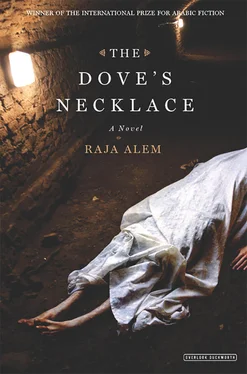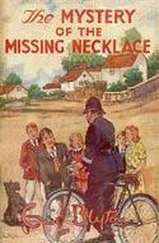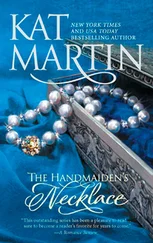If you investigate the history of our neighborhood, the Lane of Many Heads (“Abu r-Ru’us” or, the way we say it, flouting the rules of correct pronunciation, “Aboorroos”), you’ll find that it emerged as people began settling here. The municipality made it official when they gave the neighborhood a major makeover and excised its name and history. They changed the name of the street to Radiant Passage, but the Lane of Many Heads remained fuzzily in our memories, intimating some warmth whose origin we couldn’t put a finger on. Then Sheikh Muzahim came along to blast it away and shove his own memory into that spot instead:
“We never hear a single voice in the Lane of Many Heads praising God. Even the angels have washed their hands of you!”
There was no one as obsessed with perdition as the wholesaler Sheikh Muzahim. He shoved it under our noses so we could smell nothing else when we went to bed and when we rose with the birds’ hymns. Sheikh Muzahim gathered up all the original melodies, while the discordant notes gathered like a murder of crows over the Lane of Many Heads, warning us of hell.
Nasser stopped reading for a moment to hate Aisha, then continued:
“You’re driving the angels out of our neighborhood with this nudity!” he exclaimed, cursing their screens. But then the neighborhood dared to fight back:
“Land in Mecca is worth its weight in gold, but Sheikh Muzahim got his piece of paradise just by laying claim to it. He claimed this piece of land as his reward for building a mosque, a house in heaven at a discount price. Then he installed Dawoud al-Habashi as imam of the mosque, but left his salary to be paid for out of the neighborhood’s charity.”
The minaret sprouts more and more loudspeakers by the day, and neighborhood gatherings overflow with improvised sermons, trapping in their corners genetically modified rats of heresy and other unidentifiable rodents.
Why am I being so hard on the Lane of Many Heads? Have I begun to see it through your eyes?
Aisha
Azza: Potential Identification of the Deceased
I T WAS THAT SILENT TIME OF NIGHT THAT ONLY COMES HOURS AFTER MIDNIGHT. Nasser’s imagination sprang up from the silence and crept out alone to survey the Lane of Many Heads, listening carefully to how the heaps of filth on the ground sucked up his footfalls, investigating forbidding doorways barely wide enough for a human to pass through and backyards where stray horses, donkeys, and demons lived; he wanted to catch the Lane of Many Heads red-handed. He walked for hours, unaware that the Lane of Many Heads was baiting him, leading him to an old man slumbering on a low platform by the door of a beat-up old house. The neighborhood sensed Nasser’s footsteps as his bleary eyes drew him drew closer. Nasser spun round, looking for a way out, but the neighborhood had him surrounded. Like a hedgehog, it puffed out the spines of satellite dishes, which bristled from every tumbledown house, ruined backyard, and cheap prefab home of people who hawked ice or home-made food.
“Nothing’s new to an old neighborhood like me.”
Nasser’s shoulders slumped suddenly, and a feeling of immense fatigue overcame him. He collapsed onto the bench beside the ageless body, who spoke as if the voice of the alley itself were rising from beneath the bench.
“Today’s loaf comes from yesterday’s leaven: learn this lesson from my history. At first, I was inhabited by devils who helped Eve tempt Adam to leave the Sanctuary. That was back when Mecca was one of the pearls of Paradise nestled in the heart of remote Wadi Ibrahim, which I think was nothing more than the lap of a woman — first Eve, then Hagar — who spread her legs from Mount Safa all the way to the end of Mount Marwa: from the peak of splendor to the depths of beauty. Hearts were broken, and thus began the ritual of walking between the two peaks.”
The Lane snorted at Nasser’s sudden tiredness and went on with his history lesson. “You see, when God created Adam and put him in paradise, the only thing missing from this distillation of perfection was death. That’s why He cleft Adam’s breast and tore out a bone and then rolled it up into a ball, stretched it out, and made it writhe in front of Him. Adam was anxious to get his bone back, but when he grabbed it and pushed it back into place between his other bones, it was death he’d picked up. A bone outside of Adam’s breast is death itself …” The voice of the Lane of Many Heads hissed from inside Nasser’s chest. “We must bury all Eve’s daughters alive and put an end to the rift they tore open in our breasts. We must restore our bones.” Women, women: Nasser felt uneasy. The alley had hypnotized him. He was surrounded by the specters of old sheikhs, who echoed in chorus the Lane’s voice as it rose up from underfoot.
“How can you cook up the present moment without a measure of the past or a hint of the future? Allow me to reveal the key to this riddle you’re trying to solve: death is a ram that will be made manifest on Judgment Day, and life will be embodied in a towering mare with a million transparent wings that rustle sweetly as they beat. When the terrors of Judgment Day are over, after the hell-bound have betaken themselves to their hell and the heaven-bound to their heaven, the ram will be brought out and slaughtered, and the mare will be released to go forth in boundless freedom. You, Nasser—” The old man directed the accusation straight at Nasser, who couldn’t be sure whether the voice was coming from in front of him or behind him, or raining down like a curse from above. “You could collect all these stories and discover that the ram and the mare were merely a fantasy that came out of Adam’s breast. That is, that Adam overcame his imagination so he could commit suicide. It’s exactly like this case you’re investigating. It’ll never go further than the slaughter of the ram and the release of the mare, which is also Adam’s mount, incidentally, and his bone. All you have to do is ask yourself: who in the neighborhood is most likely to kill themselves, like our ancestor Adam? Believe me, there’s only Yusuf — but who’s the mare?”
The seven minarets of the Sanctuary sounded briefly, then paused to take a deep breath. As the minarets rested between calling worshippers to the dawn prayer and announcing that the prayer was about to begin, Mecca’s backstreets purified themselves in the waters of their ritual ablutions, and in that moment of stillness, the Lane of Many Heads grabbed Nasser by the throat.
“Can you hear the blood pumping through the veins of all these men I’ve lured here from the four corners of the earth with dreams of black gold? Men who left their families and children behind and swarmed here like lice to take up residence on my heads. Men who suck my blood while I devour their lives and their dreams in my shacks and squalid huts. I’m a spiteful old man: I take their youth in return for my putrid decay. There’s nothing like the dawn to awaken in men the anguish of what they’ve sacrificed in their lust for the illusion of fast food and easy riches.” Nasser tried to get up. “Why are you trying to catch one killer who killed one victim? Are you stupid enough to think that you’ll ever be able to keep an alley like me on the up and up in this ballistic age? I’m like the circle of toilets they erected, like a public fountain, at the entrances to Mina, Arafat, and Muzdalifa — innumerable toilets in adjacent square cement cubicles whose sole purpose is to receive the excrement of the faithful. I’m warning you, Nasser — don’t go digging around in my memory for a murderer. You’ll find yourself drowning in sewage and you’ll never make it out.”
In the ephemeral instant before prayers began, the universe fell silent in anticipation of the exaltation of God’s name, and in the furthest corner of his memory the Lane of Many Heads recalled with wicked pleasure the light footsteps that used to make their way across his every dawn before the body appeared — footsteps which stopped when the dove in Yusuf’s diary went wild at the sight of that body.
Читать дальше












